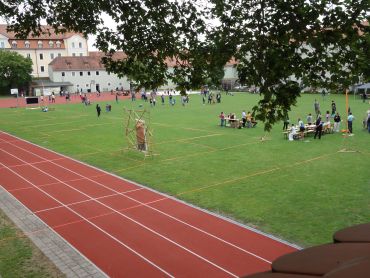The roman thermal baths
 Lost Traces - Römische Therme AAG
©
LAG, Stephanie Reiterer
Lost Traces - Römische Therme AAG
©
LAG, Stephanie Reiterer"Europe's rich cultural heritage is an essential part of our common European as well as local identity. With the European Cultural Heritage Year 2018, all citizens are invited to experience our common cultural heritage. All public and private sponsors, preservationists and mediators of cultural heritage are invited to become an active part of the year"(German National Committee for Monument Protection, www.sharingheritage.de)
The Albrecht-Altdorfer-Gymnasium (AAG), as a humanistic grammar school, felt addressed by this call to become a part of the Cultural Heritage Year 2018 and thus wanted to give the students the opportunity to actively participate in the project "Lost Traces...". Under this project title, pupils discovered lost architectural traces and gave the sites impulses for a sustainable development through temporary creative interventions and stagings. As a "lost trace", the AAG wanted to make the Roman thermal baths under our sports field visible again and to raise awareness of the Regensburgers.
As a kick-off event, the pupils were first to be familiarised with the subject matter in a workshop, and working groups were to be set up to gain an initial insight into the topics or stations to be worked on (e.g. Roman games, feel and smell stations, What is a thermal spring?, How does a hypocaust work?, Roman Regensburg, etc.). In addition to designing an attractive information poster, the pupils should also work out how their topic could be presented graphically by themselves at the Roman festival. Especially the "visiting children" should be made aware of local history in a lively way and at eye level. Further project work took place in small groups and could be integrated thematically into the curricula of the subjects German, History and Latin.
Then, on Sunday, 24.06.2018, parallel to the Ostengassenfest, a full-day Roman children's festival - by children for children - was held on the AAG sports field with pupils from the 6th grade.
The visualisation of the Roman thermal baths there and various play and participation stations formed the major part of this project, which took place in very close cooperation and support with the State Office for the Preservation of Historical Monuments, the City of Regensburg, the Social Initiatives and Architecture and School e.V. etc. A small Roman "rest stop" invited the participants to stay and try typical Roman food. We had the visit of a "real" Roman legionary, who was constantly present during the festival and gave short lectures about equipment and the life of a legionary.
